- Home
- Joy Dettman
Thorn on the Rose Page 2
Thorn on the Rose Read online
Page 2
Sissy Morrison left the window, relieved she hadn’t been made a fool of, but wanting the details of the aborted wedding.
Her parents weren’t talking — to her, or to each other.
Norman sat at the table, in his immaculately clean kitchen, head in his hands. He had raised Jennifer from infancy, as his own, and on his own for six years — his golden songbird, beating her wings against the bars of his common cage. She had escaped; battered, bruised, but free. He envied her flight.
There was no escape for Norman. A waddling wood duck, his wings clipped by his mother, his tail feathers plucked by his firstborn, his quack silenced by his wife, the whore, still clad for the wedding that never was.
Had he wanted that girl wed? Perhaps he had, for her good name’s sake, for his own and her sister’s good name’s sake, for his grandchild.
His grandchild? Was it his grandchild? He could not think of it as such.
He glanced at Amber, busy at the stove, sweeping up a scattering of soot with a small shovel and brush.
She had given up her own bridal gown when Jennifer asked for it. He had not expected that. She had taken it willingly from its box, aired it, sponged it, pressed every crease from it, hung it for a week from the curtain rod in the parlour, the long train draped over his couch. She’d spent two days baking for the wedding feast at Maisy’s house — eager to see his golden songbird wed to a dirt-scratching mole, her belly swelling each year with Macdonald litters. His wife, the whore, had wanted that wedding. She had been happy these past weeks, had dressed happily this morning. His wife, the whore, was not often happy.
She was cleaning now, in her new wedding suit, a muted checked beige. A beige woman, Amber, afraid to show her true colours. Red anger was in her brow this morning, white rage in her compressed jaw as she swept. She liked a tidy kitchen.
Kept her distance from the western window. Kept her distance from the jubilant eyes of Mr Foster, their postmaster neighbour. He had been at the church, and certainly his eyes had laughed, as had John McPherson’s and his schoolmistress wife’s — as had a few.
Mr Foster’s eyes would be pressed to a knot hole in the paling fence, or peering from his bedroom window, which offered him a fine view of Norman’s kitchen window.
‘How did she get on the train without you seeing her?’ Sissy said.
Norman waved her question away. He didn’t know how Jennifer had boarded the train, or if she had boarded the train. He hadn’t seen her.
‘He knew,’ Amber said.
Norman glanced at his wife, the whore. During the early years of his marriage, he’d attempted to understand her. Now he attempted to stay well clear of her. He had his station and a few comforts there. Not this morning. Not yet. First allow the town’s laughter to die.
He glanced at his daughter and saw his dead mother. A big girl, Sissy, a Duckworth in build, wide in the hip and buttock, heavy in the thigh and ankle, but longer than the usual Duckworth. She had inherited her maternal grandmother’s height and perhaps her maternal grandmother’s hair. Her saving grace, that hair, dark and heavy.
‘How did he know, Mum?’ she asked.
‘He sold her the ticket,’ Amber said, her face aged by her grimaced words, mouth lines deepening, indentations from outer eye to jaw. A pretty girl at twenty, his wife, the whore. She had not aged well.
‘If he sold her a ticket last night, why bother getting dressed up to go to the church this morning?’ Sissy argued.
Norman nodded, pleased by his daughter’s logic. Her arguments were not always so logical.
His wife, the whore, did not appreciate logic. She vacated the kitchen, Sissy behind her. Norman was free to sit then, free to stare at the window, at a fly buzzing to get into Amber’s kitchen.
Fool of a fly, he thought.
UNRESOLVED
Jenny’s unnamed infant sucked on, unaware of the part she’d played that Saturday. Born a pale, hairless midget, she’d put on little weight in her six weeks of life but grown no hair. She was as bald as her grandfather, her naturally pale Macdonald complexion was made more obvious by the darker than average breast of her surrogate mother.
Had Elsie Hall been sighted walking down a street in Spain, she wouldn’t have received a second glance. She had her father’s European features. Every time she ventured into town at the side of her lanky redheaded husband, she received more than her fair share of second glances. In Woody Creek, Elsie was recognised as a light-skinned darkie.
Harry Hall, considered by most to be a reliable and decent enough young bloke, drove one of George Macdonald’s mill trucks, had been driving for George since ’31. He wasn’t a good-looking boy; snub-nosed, watery blue eyes, a blotch of freckles, long boned and not enough fat on them — and a city blow-in to boot, which hadn’t stopped a couple of the town girls from giving him the eye. He’d got himself involved with Gertrude’s darkie, and like a fool, done the right thing by her — or that’s what they said in town. They didn’t know much in town.
Harry was going on for twenty-three, and already raising three of his own kids along with Elsie’s niece and nephew, plus Joey, Elsie’s fourteen-year-old son. And no happier man lived in Woody Creek.
He’d started losing his first family at twelve. Two weeks after his thirteenth birthday, he’d buried his father. Orphaned, he’d caught the train west to spend the worst years of the depression with a dirt-scratching cousin, fighting the bunnies for a blade of grass to chew on. At fifteen he’d caught the train back, to try his chances alone.
An accident landed him in Woody Creek. A second accident had given him a home with Gertrude. He called her Mum, but considered her more angel than a mother. She’d built him and Elsie a little house in her front paddock, built it high enough off the ground to keep it above the floodwaters she knew would come again one day. Only a two-bedroom house, it hadn’t been designed to contain a tribe, but it had front and rear verandahs.
On the day of the cancelled wedding, Harry was working on the conversion of his back verandah into two sleep-outs, while keeping his eye on the traffic piling up in Gertrude’s yard. The bike of Denham, the local constable, had joined Vern’s and Maisy’s cars.
‘What’s he want?’ Elsie said.
‘The twins or Jenny,’ Harry said.
Gertrude’s visitors left as they had arrived, Denham first, followed by Maisy and George, then half an hour later by Vern. That’s when Gertrude started her search for Amber’s wedding gown.
Yesterday when Maisy had delivered the gown, Jenny had hung it from a nail driven into one of the lean-to rafters. Gertrude hadn’t thought about it until this morning. Like Jenny, it had gone missing.
It wasn’t in the lean-to wardrobe. She looked beneath the bed, opened and closed drawers, searched her own bedroom for it, opened old trunks. She wasted an hour in looking for that gown, then gave up and went over to watch Elsie and Joey hold up a prefabricated wall while Harry hammered.
‘Did you find it, Mum?’
‘Not yet,’ Gertrude said.
‘She’s took it with her,’ Elsie said.
‘It’s the last thing she’d take.’
‘What did Denham want?’
‘She’s too young to be out there by herself. I’ll feel better when I hear that she got to her penfriend.’
For three days Gertrude looked for Amber’s wedding gown, or for scraps of it. She caught sight of white against her fence. Only paper, only white feathers.
For a week she waited to hear that Jenny had arrived safely. From Monday to Friday, she, Joey or Harry called into the post office, hoping for a letter that never came, then Gertrude gave up waiting and wrote to Mary Jolly.
The crippled postmaster recognised the name, the address on Gertrude’s envelope. He had addressed Jenny’s first letters to her penfriend and saved every reply in a box beneath his counter, each one addressed to Cara Jeanette Paris, a small deception he had allowed. Mail was sacrosanct. Gertrude’s letter went into the mail sack and would be deliv
ered. Mary would not know the Jennifer Morrison Gertrude had surely enquired after.
He sent a telegram to the same address, asking if Cara had arrived safely.
If the telegram was delivered, it was ignored.
Previously he had interfered in Jenny’s life. He had no wife, no child, no niece or nephew. He did it again. He spoke to Denham, who spoke to Gertrude, and on the fifth day of June, she drove with Vern to Melbourne.
A bitter day of sleeting rain, but they found Surrey Hills, they found the address, found the house in a street of similar houses. Gertrude knocked on the door.
It was opened by a girl of ten or twelve. She didn’t know Mary Jolly. Her mother came, an infant on her hip. They’d moved to Surrey Hills back in February, she said. She didn’t know who had rented the house before them.
‘The lady next door has been there for years. She might know the person you’re looking for.’
They went next door where they learned that old Mrs Jolly had died in January, during the heat wave, that Mary had moved in with one of her brothers.
‘She’s a cripple, you know. She couldn’t manage alone, even if her brothers had kept on paying the rent.’
‘Has a young girl been here looking for her?’ Gertrude asked.
‘No, dear, no young girl. I had a couple knock on my door one day, but I told them the same as I’m telling you.’
‘Miss Jolly had a job in the city, I believe,’ Vern said.
‘She did too, and lord only knows how she got herself in there and back every day. The poor girl is terribly crippled, but a real lovely girl anyway. Always a smile for me, and as I said a hundred times to my husband, she didn’t have much to smile about.’
‘You wouldn’t know where she worked?’
‘For some lawyer chap, I think. She was one of those typewriters. There was nothing wrong with her hands.’
‘No idea of his name?’
‘I’m not the sticky nosing type, my dears. I leave my neighbours to themselves as much as I can. The worst thing you can do when you live so close by is to live in your neighbours’ pockets — or so I’ve found.’
There were a lot of lawyers in Melbourne. They couldn’t knock on every door. And who was to say that Mary was still working, and who was to say that the brother she’d gone to live with lived in Melbourne?
Gertrude had kept in touch with Ernie Ogden, who had been the law in Woody Creek through the twenties. Six or so years ago he’d put in for a transfer to Mitcham, which according to Vern’s city map wasn’t a lot further along the road they’d taken to get to Surrey Hills. Ernie would be the chap to speak to.
In mid-June, the newspapers printed a photograph of Jenny, taken on the night she’d come third in a radio talent quest. It was on page five, and not large enough to catch most eyes. Nor was the caption: HAVE YOU SEEN THIS GIRL?
The front page was full of Hitler’s escapades. Page two’s headlines shouted NATIONAL REGISTER OF MANPOWER. And there could be only one reason why the government was registering its manpower. War. There was a column on the same page mentioning that the Defence Act would be extended to include New Guinea as a territory where conscripts might be sent. Those with sons of fighting age read every word of page two. Vern Hooper’s son, Jim, was of fighting age. Ogden had seven sons, all of fighting age.
Norman Morrison had no sons. His wife had carried three. They’d died at birth — or soon after. Poor eyesight had saved Norman from the first war, though it did not prevent him reading the Sun newspaper from cover to cover.
He read of a gunman terrorising Melbourne, who had made his escape in a green Ford.
The car pulled into the kerb beside Mr Thompson. The gunman alighted and demanded the canvas bag. No shots were fired. Mr Thompson was able to give police a description of the wanted man. He is approximately six foot in height, of medium build, was wearing grey sports slacks, a tweed jacket and a grey felt hat. He is thought to be in his mid-thirties and was last seen driving west on Whitehorse Road.
Then he turned the page and his eye settled on the photograph of Jenny. He had not reported her missing. Life in his house had been . . . difficult since May. Sissy’s social life having revolved around Jim and Margaret Hooper, who had been keeping their distance since the aborted wedding, Sissy housebound was vocal. Norman craved an end to her tantrums. He craved peace.
HAVE YOU SEEN THIS GIRL?
Fifteen-year-old Jennifer Carolyn Morrison, missing from her home since May, is described as five foot five, of slim build, short golden blonde hair and sapphire blue eyes. She was last seen wearing a long black overcoat and green beret. She is believed to be somewhere in Melbourne. Anyone with information on her whereabouts is asked to contact their local police station.
Back in ’24 that same newspaper had printed a photograph of Jennifer’s dead mother, with a similar short paragraph beneath it.
The circles of life, he thought.
Jennifer had not been meant for this town. He had taken that dead stranger’s child into his house and given her his name. He had wanted the best for her, and done the worst by her.
He turned the page.
Charlie White, Woody Creek’s grocer, stood behind his counter, reading that same newspaper and knowing it was only a matter of time, a matter of how far Hitler intended pushing his luck and his borders, a matter of how far England and France would allow him to push those borders before they were compelled to stop him.
Roosevelt had been in touch with Hitler and Mussolini, urging them to give assurances of peace. They’d given no assurance. War was coming — and too soon after the last. Just a case of when.
For years Charlie had been telling anyone who’d listen that the Versailles Treaty the Allies had forced on Germany after the last war had left that country nowhere to go but back to war.
‘Miserable warmongering old bugger,’ they called him.
Maybe he was.
He was a widower and a lonely man once he closed that store. He lived with his daughter and son-in-law, who didn’t want him living with them, but as he owned the house they lived in there was little they could do about that. They did a few hours’ work at the shop. He paid them well, and paid their bills, and lectured them over the dinner table each night.
‘Relations between Japan and the United States have been deteriorating for years. Britain has got bases in Singapore, Malaya and Hong Kong, a bare cat’s whisker from Japan.’ Charlie knew what was coming.
‘For God’s sake, Dad. Can’t we have one meal in peace?’
‘You won’t know the meaning of that word soon, girl. You mark my words. The Japs have got a navy second to none, and there’s millions of the little yellow buggers crowded onto a few islands. They’ll look down at Australia and see land for the taking,’ Charlie said.
Australia wasn’t ready for war. Compulsory military training had been abolished back in the early twenties. The depression had further depleted the size of the regular army. Bob Menzies had allocated forty-three million to be spent over three years in expanding the defence forces, but by July of 1939, anyone bar a fool knew they didn’t have three years.
‘I’ll give it three months,’ Charlie said.
The Melbourne gunman was doing his best to push Hitler and Mussolini from the front page of newspapers. He never struck in the same place twice. He got away from a jewellery shop in the middle of Melbourne with rings worth hundreds of pounds. He held up a bank sixty miles out of Melbourne, held up the owner of a big furniture store in Richmond. He struck at another bank in Frankston.
That one made the front page, with a photograph of a young couple and an artist’s sketch of the bank robber.
Mr Victor Howard and his fiancée, Miss Martha Williams, a young couple saving for their wedding and accidental victims of yesterday’s bank robbery, were able to give police their first clear description of the bandit who has been eluding Melbourne police for months. He is believed to be between twenty-five and thirty, in excess of six foot and of slim build.
The couple entered the bank at ten thirty yesterday, where they handed over their deposit to a redheaded male installed behind the teller’s cage. The gunman had entered the bank earlier that morning and locked bank staff in the manager’s office.
‘He seemed to know what he was doing,’ Mr Howard said. The brazen thief wrote the amount of their deposit in their book then stamped and signed it before the couple departed, unaware that they had been the victims of a bare-faced robbery.
‘He was a very nice-looking chap and very well mannered,’ Miss Williams told the reporter.
Hitler and his goose-stepping troops took a step too far on the first day of September: they invaded Poland. Two days later, Britain and France declared war.
The news came to Woody Creek on the wireless. Bob Menzies’ words sounded like a death knell.
We are at war.
Anyone over the age of thirty could remember the carnage of that last war. Speak to any man, woman or child and they’d tell you of a son, brother, nephew, cousin, uncle lost to that war to end all wars.
Charlie White’s son-in-law had lost an arm to it and a brother. Tom Palmer had lost a brother. John McPherson had lost his father, his wife, a fiancé. Lonnie and Nancy Bryant lost two sons. Thousands upon thousands of boys had died in that bloody war — and now their sons would die.
‘Where’s the government going to raise money to equip an army?’ a few of Charlie’s customers asked. ‘They couldn’t raise five bob to put shoes on kids’ feet a while back.’
‘Governments will always find money for their own causes. You watch it start to flow now,’ Charlie White said.
‘They’re not getting their hands on my son to use as cannon fodder. I’ll cripple the little bastard before I let him go.’
‘You can’t put an old head on young shoulders,’ Charlie said. ‘They’ll go like they did the last time.’
They’d go. Since the aborted wedding, since George had cut off his twin sons’ allowance, they’d been working at the mill. The day war was declared they took off to join up, which left George two men short at the mill — or maybe one.

 The Hope Flower
The Hope Flower Trails in the Dust
Trails in the Dust Diamonds in the Mud and Other Stories
Diamonds in the Mud and Other Stories Moth to the Flame
Moth to the Flame The Tying of Threads
The Tying of Threads Wind in the Wires
Wind in the Wires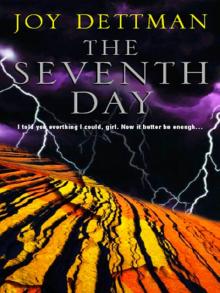 The Seventh Day
The Seventh Day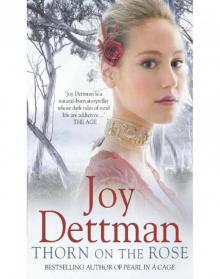 Thorn on the Rose
Thorn on the Rose Jacaranda Blue
Jacaranda Blue Mallawindy
Mallawindy Ripples on a Pond
Ripples on a Pond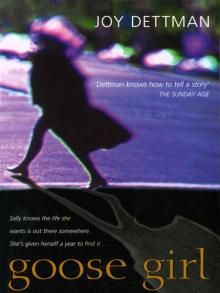 Goose Girl
Goose Girl The Silent Inheritance
The Silent Inheritance Henry’s Daughter
Henry’s Daughter Yesterday's Dust
Yesterday's Dust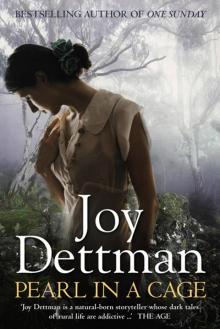 Pearl in a Cage
Pearl in a Cage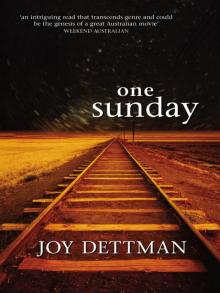 One Sunday
One Sunday